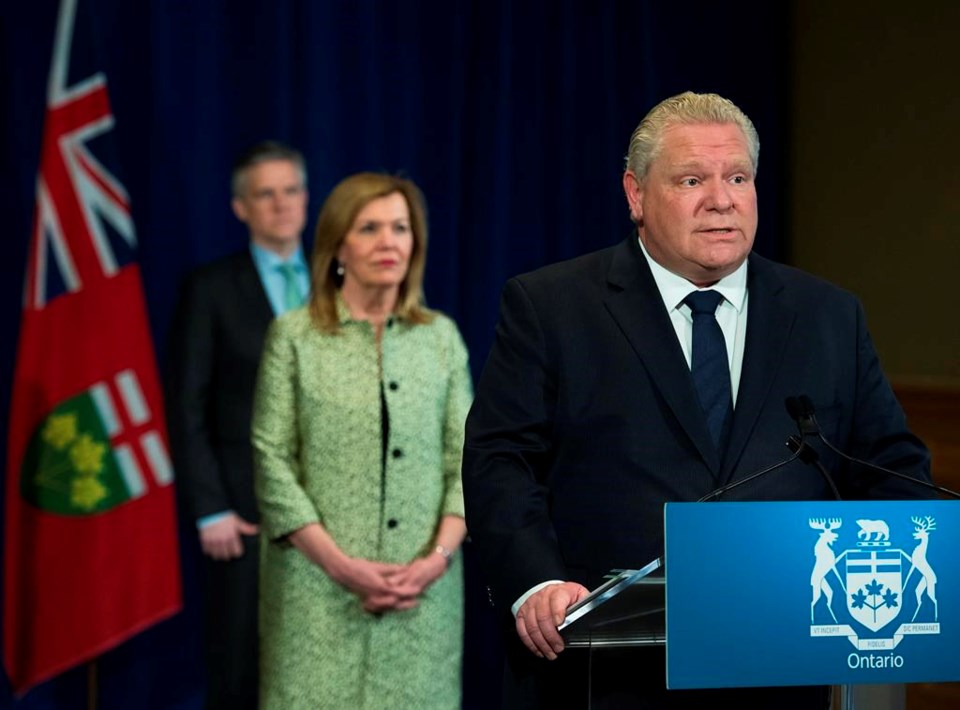TORONTO — Details on the first stage of Ontario's reopening plan will be coming this week, Premier Doug Ford said Tuesday, as the province extended its state of emergency to June 2.
In his daily briefing, Ford teased "good news" coming Thursday, saying the people of Ontario have followed all the protocols.
"(We'll have) more good news about getting people back to work, more good news about opening workplaces, getting paycheques out the door, more good news about slowly getting back to normal," Ford said.
"We'll be reopening more low-risk workplaces, seasonal businesses and essential services."
This week, retail stores were allowed to reopen for curbside pickup and delivery, while hardware stores and garden centres have been allowed to reopen to in-store customers.
Stage one in the province's reopening framework also includes allowing for more people at certain events such as funerals and having hospitals resume some non-urgent surgeries.
Currently, gatherings of more than five people are not allowed, and Ford said he is discussing with the chief medical officer whether it will be safe to move it to a maximum of 10 people.
Ontario reported 361 new cases of COVID-19 on Tuesday and 56 more deaths. That brings the province to a total of 20,907 cases, representing an increase of 1.8 per cent over the previous day, continuing relatively low growth rates seen over the past several days.
The total includes 1,725 deaths and 15,391 cases that have been resolved.
Ontario's legislature was in session Tuesday — with politicians practising physical distancing — to extend the province's state of emergency.
The state of emergency is dealt with separately from the emergency orders, recently extended to May 19, which cover closures of bars and restaurants except for take-out and delivery, theatres, outdoor amenities such as playgrounds, and child care centres.
Ontario has previously announced that publicly funded schools will be closed until at least May 31, and Ford has said that news on child care centres and schools is coming early next week.
Only Randy Hillier — a former government member now sitting as an independent after being kicked out of caucus — was opposed to extending the state of emergency.
"We must stop amplifying the danger and begin communicating a better understanding of the risk," Hillier said.
The government and the opposition politicians also agreed to bring back question period on a semi-regular basis, at least until early June, when the legislature had been set to rise for the summer.
During the first such session Tuesday, the official Opposition called on the government to hold a public inquiry into the long-term care system.
NDP Leader Andrea Horwath said the province must investigate the system that has been at the centre of numerous deadly outbreaks during the pandemic.
More than 1,200 long-term care residents have died of COVID-19 in the province, and 180 homes have outbreaks of the virus.
"Families with loved ones in long-term care are demanding answers," Horwath said. "They deserve those answers. They deserve a full public inquiry that is non-partisan to give them those answers."
Ford said his government would review the system but did not commit to holding a public inquiry.
"I can promise you one thing, we are going to fix it," he said. "We're going to fix it collectively as a legislature — not just a party, but everyone in this room."
Ontario also reported Tuesday that just under 12,000 tests were completed in the previous day — the lowest total in a week. The government had pledged to conduct 16,000 tests a day by now, moving toward 20,000 a day.
Health Minister Christine Elliott said that there are often delays in getting samples from assessment centres to labs over the weekend, which explains why the numbers often dip early in the week.
Ford said by early next week Ontario will have fulfilled its pledge to test every long-term care resident and worker. After that is accomplished, he said the province should start doing random community testing.
Chief medical officer of health Dr. David Williams suggested there is little value in truly random testing.
"It has to be thought through, it has to be targeted, because it's a fairly big investment of time and energy," he said.
This report by The Canadian Press was first published May 12, 2020.
Allison Jones and Shawn Jeffords, The Canadian Press

